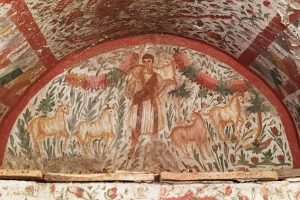Galatians 1:11-19 • Luke 8:5-15
Glory to God the Father, to the Son, and to the Holy Spirit.
The Lord Jesus Christ gives us the parable of the farmer planting seed this morning, and he explains that he is talking about responding to the Word of God. Now, it’s true that the Word of God is the Lord Jesus Christ – he is God the Word before the ages. But we also talk about the word of God as in the thing that the Lord has said, and specifically the scriptures.
Abba Poemen wrote: “By its nature, water is soft while a stone is hard. However, when water runs along a watercourse and drips on a stone, it slowly but surely makes a hole in it. Likewise, the word of God is soft while our hearts are tough. However, if a person frequently listens to the word of God, his heart softens and becomes capable to accept the fear of God.”
The Lord says today that there are four ways of responding to the word of God. Interestingly enough, three of them involve right belief. That is, three of them involve a right understanding and confession of who Jesus is. But only one of these ways leads to eternal life.
We can believe the right things about Christ and not be saved by the right belief; it is faithfulness that participates in the grace of God.
The seed falls by the side of the road. It lands on concrete, and birds come and eat it up. This is a hard heart, a heart that is so hardened by sin that it is not going to receive the word, and so the devil comes along and steals the word out of the heart. This person might know all the facts, but if he doesn’t do the word, then it profits him nothing (James 1:22-25).
Another seed fell on stony ground and sprouted quickly, but it had no deep root. So when the heat came, it withered away. This is a person who hears the word of God and accepts it joyfully – but this person is not changed by it. And because this person’s life has not been changed by the word they heard, when difficulties come along, they fall away.
Then there’s the seed that fell among the weeds and thorns and grew up – but it was choked among the weeds, so that it didn’t bear any fruit. These are those who hear the word of God, accept it and believe it, and choose to live this radical life of discipleship – but they also want to live their best lives now. They’re concerned about money, about their job, about advancing in their career. They have travel plans. They have responsibilities.
They are not sinning by having plans and concerns – but salvation is just one of the things calling for their attention. And when the love of God becomes just one of the things on their list, they are choked with cares and riches and pleasures of this life, and bring no fruit to completion.
And then there is the seed that fell on good soil, and bore fruit in various quantities: thirty-fold, sixty-fold, a hundred-fold. These are those who receive the word of God with an uncomplicated heart, who with love and fear of God bring fruit to maturity. These are people who bring about virtues, who do good works, who are transformed by Christ. The way they use their finances, the way they spend their time, the things they devote themselves to, are visibly out of step with their generation. And because their roots are going deep in the Gospel, these bear the fruit of the Spirit, and are conformed to the image of Christ.
And notice that these don’t all do the same thing. They bring about different amounts of fruit, their lives all differ, but all these are the fruitful ones.
This parable is not meant to teach us that there are four kinds of people in the world. The Lord is saying there are four ways of responding to the Gospel. And in fact it is possible for one person at different times to be all four kinds of soil.
Are you one of those who has heard the gospel of the Kingdom, but you’ve gotten consumed by pleasures, distracted by money, sidetracked by your other goals for life in this world? It doesn’t mean that you are condemned to be that. It does mean that you can repent! It does mean that today you can prepare the soil of your heart. That can be done, whatever you have been until today.
If you and I are rocky, unfruitful soil, hard as concrete, the prophets call us: “Break up your fallow ground, for it is time to seek the Lord, till He comes and rains righteousness on you.” The Lord gives us that command twice in scripture, in Jeremiah (4:3) and again in Hosea (10:12).
A farmer does not always plow and plant and harvest from every acre of farmland he owns. He may let the land rest and recover for a season. That land, fallow land, gets rained on and is baked by the sun, and that means next year that land may be too hard to plant anything in it. Speaking to the Hebrew people, the Lord tells them to “break up your fallow ground.” Plow it, soften it, prepare it for seed.
The hard, stony, weed-choked soil of the heart is not incurable: By grace we can break the hard heart, soften the soil, and “prepare ye the way of the Lord” (Isaiah 40:3).
So this morning, I want to tell you how to become the good soil, so that the word of Christ may dwell in you richly and bear fruit.
First of all: Adjust your priorities. Now, by this I do not mean that in the list of priorities in your life, you need to somehow move the Lord Jesus Christ to the number one spot. I’m not saying that at all.
I’m saying you need to get rid of the list and make the one priority of your life to love the Lord Jesus Christ, and love your neighbor, your family, your enemy. Understand that you have a calling on your life, a vocation. “You are no longer strangers and foreigners, but fellow-citizens with the saints and members of God’s household” (Ephesians 2:19). That’s your calling, and it is a great and a high calling, and it means that every aspect of your life needs to be in service to that vocation.
You occupy many different roles. You’re a spouse, a parent, a son or daughter, a brother or sister in Christ, a friend, a worker. Don’t cut your job out of this. That’s part of it. But everything about your life must be led captive to your destiny of entering the Kingdom of Heaven and living as a son and daughter of the King here and now.
Whether you want it or not, whether you realize it or not, you are in full-time ministry. The mission field where you carry out your ministry may be a warehouse or an office, at home with a child, caring for an elderly parent. That’s the place where you are uniquely able to bless the specific people God has put in your life – by praying and interceding for them by name, by practicing kindness and patience toward them, by suffering stress together with them and letting patience have its perfect work in you.
In each one of your roles, you are a servant of God. Be the best spouse that you can be in order to express Christ in your marriage, the best parent, the best laborer, the best brother and sister in Christ, in order to serve and bless, as a fellow-citizen with the saints in the Kingdom of God. Every concern and goal and priority in the life of a disciple finds its place under this one holy vocation. That’s why we pray daily, “Let Thy kingdom come” here and now. “Let Thy will be done on earth as it is in heaven.” This is what I mean by adjusting your priorities.
King David writes, “One thing have I desired of the Lord, and that will I seek after: that I may dwell in the house of the Lord all the days of my life” (Psalm 26:4lxx). Now David did not physically dwell in the tabernacle of God; he had a house of his own. But day and night, as king, as a husband, as a judge of disputes, as a father to his sons, as best he could, David lived in the presence of God, in prayer without ceasing. I don’t know what his daily morning prayers looked like, if he did that. And we know he failed and sinned and repented. But he struggled to dwell in the house of the Lord, to abide in God.
* * *
If you ask some folks what is different about how we Christians live, you may hear a lot of negatives. Christians don’t get drunk, we don’t sleep with people we’re not married to, we don’t remember wrongs, we don’t gamble, we don’t use coarse language, we don’t watch certain movies. Sometimes we don’t eat meat. There can be a lot of Don’ts.
I talk to Orthodox folks whose spiritual life revolves around a treadmill of sin, repentance, grief, frustration. If that’s how the struggle feels right now, then I am so sorry the Lord’s expectations have been misrepresented to you.
Because this morning the Lord is not talking about what we ought to stop doing, or avoid, or fight against. The goal when you plant seeds is not purity. It’s a harvest. Some bear fruit thirty, sixty, a hundredfold.
We know what Christians don’t do. So what do we do?
Disciples of Christ, called to be saints, full of the creative power of the living God, are peace-makers, doers of mercy. We honor one another, especially our elders, and with love and gentleness we teach our children by example to honor the Lord. We create — art, music, stories, designs, communities. We put our body’s strong energy to work serving one another, serving the parish and school, serving the elderly and moms and the sick. We put our time and vehicles to work giving rides and building friendships. We encourage one another, speak to one another in psalms, hymns, and spiritual songs. We practice hospitality. We cook, we play, we delight in the goodness of God.
And we may or may not be gifted to teach about the mysteries of God, but we listen, meet people as they really are, let them know we see them, we love them – and we make room for the Holy Spirit of God to call them to Christ.
When John the Baptist preached, “Bear fruit worthy of repentance,” he wasn’t talking about praying harder, fasting more strictly, or getting it right. “The fruit of the Spirit is love, joy, peace, longsuffering, kindness, goodness, faithfulness, gentleness, self-control” (Galatians 5:22-23).
The life in Christ is not about moralism. We have not been called to manage our sins, but to do justly, to love mercy, and to walk humbly with our God (Micah 6:8). “Herein is my Father glorified, that ye bear much fruit – so shall ye be my disciples” (John 15:8).
* * *
The last thing I’ll add is this: You must not despair. You must not despair when you sin. You must not despair that you are struggling with the same things over and over and over again. Recognize despair, discouragement, the absence of hope, as an alien temptation: It has been thrown into your thoughts like a grenade by an enemy.
You didn’t get broken in a day. You’re not going to get fixed in a day. It is going to take time. So, be patient. Stay the course. Pray when you don’t want to. Come to church when you don’t feel like it. The Lord never commanded you to feel a certain way. Be merciful, do acts of mercy when you’re not feeling merciful. What you do matters; what you do bears fruit. And when you stumble and fall down, make the sign of the cross, get up, and keep walking.
This is how you prepare the soil of your heart. This is how your heart can become rich and fruitful, how you can produce virtues, and grow into that divine likeness that Christ our God intends to make you.
“The seed in good soil: These are the ones who have heard the word in an honest and good heart, and hold it fast, and bear fruit with perseverance” (Luke 8:15).
Now “the fruit of the Spirit is love, joy, peace, longsuffering, kindness, goodness, faithfulness, gentleness, self-control” (Galatians 5:22-23). That’s a promise. This is what God wants to create in you. This is a promise, if you will receive it. This is hope.
Now to him who is able to keep you from falling, and to present you before his glorious presence without fault and with great joy: To the only wise God our Savior be glory and majesty, dominion and power, both now and ever (Jude 1:24-25).
To the glory of God the Father, the Son, and the Holy Spirit. Amen.






